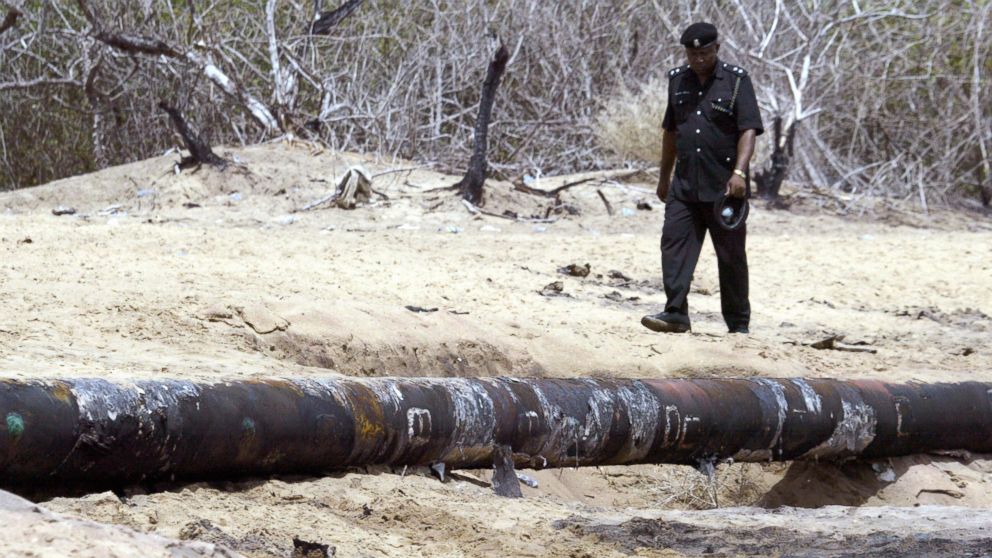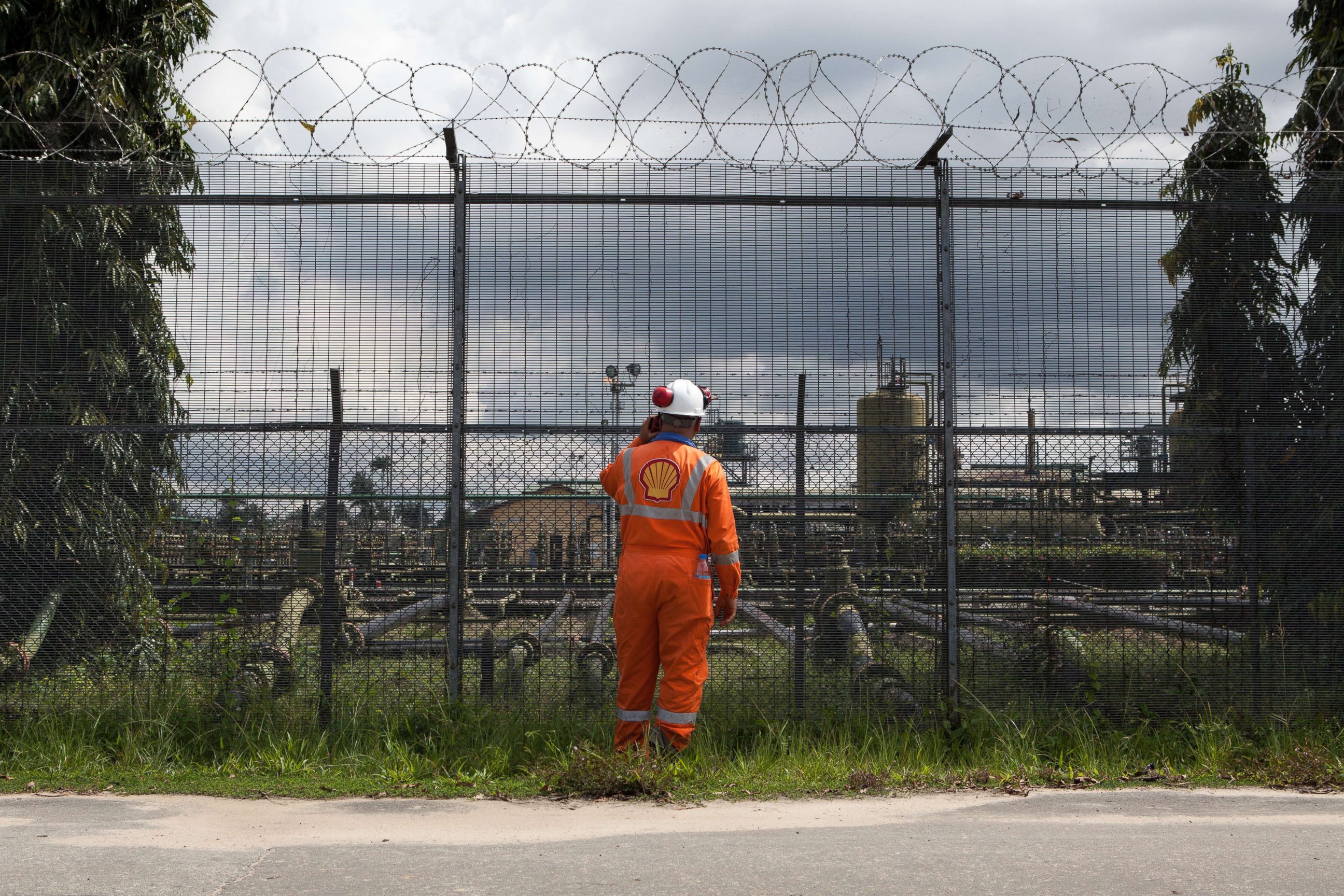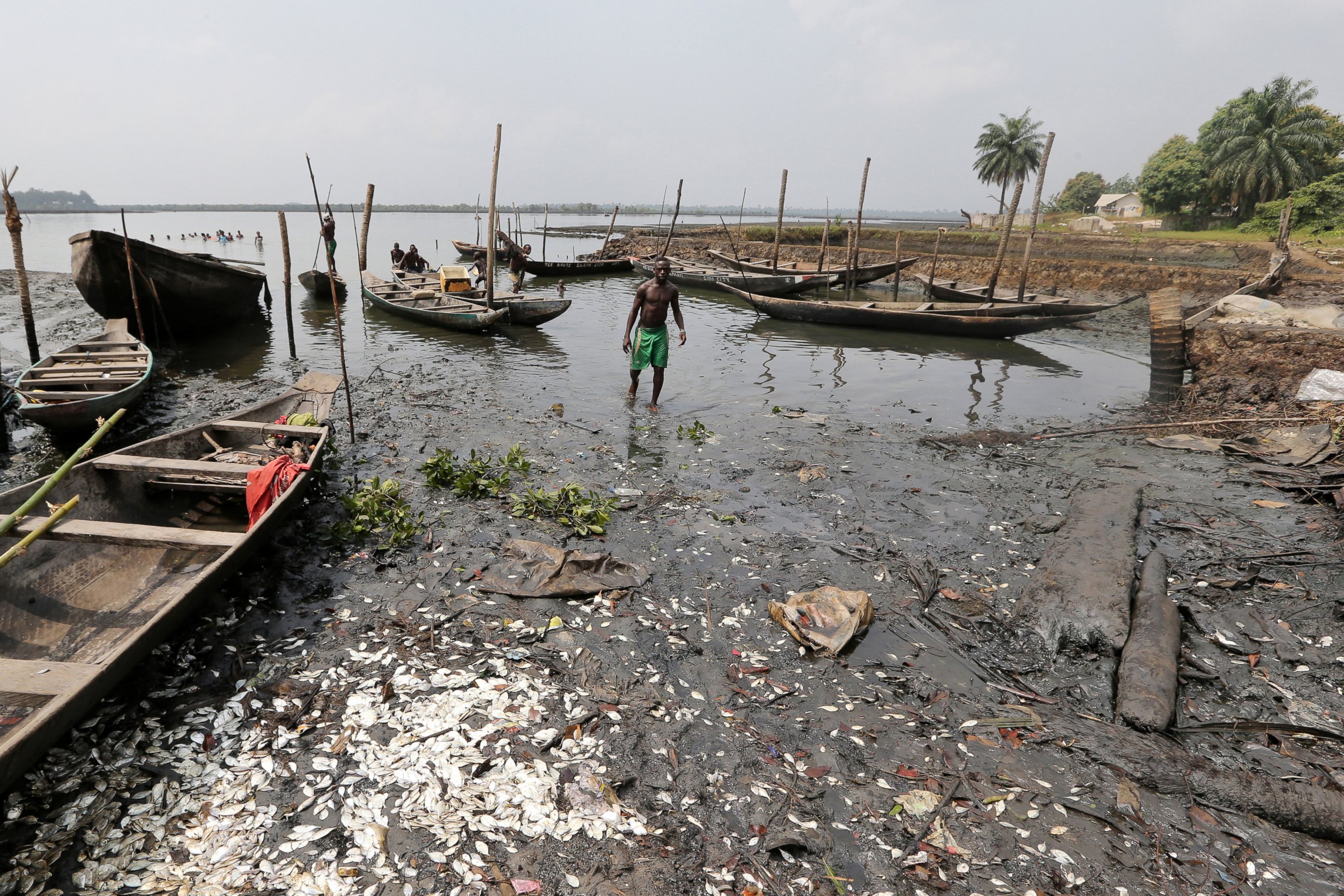Rebel Group The Niger Delta Avengers Threatens One of World's Largest Oil Supplies
Group demands more profits to the people and less damage from oil production.

— -- While Nigerian soldiers battle Boko Haram militants in the north, a new radical group has emerged from the southern swamplands, threatening to wage war on one of the world's largest oil supplies.
The group calls itself the Niger Delta Avengers, and it has claimed responsibility for a spate of recent attacks and bombings on oil pipelines and terminals in Nigeria's southern region, the Niger Delta, a top oil-producing region.
The group has targeted major platforms belonging to Shell and Chevron in the past few weeks, and its attacks have driven the country’s oil output to a near 22-year low.
Not much is known about who is behind the Niger Delta Avengers. But the militants are making their mark on Nigeria’s southern infrastructure, and there are calls for President Muhammadu Buhari to take steps to prevent the militant group from growing.
“The Niger Delta Avengers have obviously proven themselves to be very effective in this one area of Niger Delta,” said Matthew Bey, an Africa energy analyst at Stratfor, a geopolitical intelligence firm in Austin, Texas. “It seems to be a new generation of militant groups.”
WHERE DID THEY COME FROM?
The Niger Delta Avengers emerged in February, after claiming responsibility for an attack on an underwater pipeline run by Shell, forcing the oil giant to halt its 250,000-barrel-per-day Forcados terminal for weeks. The militant group has since taken responsibility for several other attacks in the southern Delta state, including one earlier this month at an offshore oil platform run by Chevron, which produces tens of thousands of barrels a day.
The attacks showed a level of sophistication and technical expertise, raising speculation that the new group consists of former members of the long-running and powerful rebel group Movement for the Emancipation of the Niger Delta (MEND).
“It’s hard to say whether these guys are former militants, but they’re definitely tapping into the established knowledge base,” Bey told ABC News.
MEND wreaked havoc on the six states in the Niger Delta from 2006 to 2009, costing the nation roughly one-third of its oil production, until then-President Umaru Musa Yar'Adua offered a multimillion-dollar amnesty program that had thousands of rebels agree to lay down their arms in exchange for an unconditional pardon and stipend.

WHAT DO THEY WANT?
Like MEND, the Niger Delta Avengers demand greater ownership of lucrative oil resources for residents in crude-producing areas. The new group also seeks environmental restoration, compensation for damage caused by oil producers and sustained government funding for the amnesty program. The group has threatened to shut down the West African nation’s production of oil and gas if its demands are not met.
The Niger Delta Avengers’ attacks have led Nigeria’s oil output to plummet by nearly 40 percent since before the campaign began, the country’s Oil Minister Emmanuel Ibe Kachikwu said while addressing parliament last week, according to Reuters. The loss dethroned Nigeria as Africa’s top oil producer.
Another group, the Red Egbesu Water Lions, which emerged last Wednesday, has vowed to join the Niger Delta Avengers if their demands are not met within the next seven days, local media reported.
MEND, on the other hand, has distanced itself from the Niger Delta Avengers and the recent attacks on the region’s oil installations. In a statement reportedly signed by its representative and published by local media, MEND said Sunday it “wishes to condemn and dissociate itself from the recent activities carried out by the group known as the Niger Delta Avengers.”
“Their sudden emergence has absolutely nothing to do with the Niger Delta struggle but is rather a tool by certain elements to destabilize the current government,” MEND continued.
MEND’s condemnation of the Niger Delta Avengers came as no surprise to Akin Iwilade, a research student at Oxford University who studies youth, violence and the politics of amnesty in Nigeria’s oil-producing region. The newly formed group threatens to disrupt the profitable amnesty deal the former militants currently enjoy.
“The top leadership of MEND benefited from the patronage that came with the amnesty,” said Iwilade, who has spoken with a number of former oil militants in recent years. “It is very logical and, frankly, expected, that they would condemn a group they obviously have little control over.”

WHAT IS THE THREAT?
Buhari, who took office in May last year, extended the amnesty program for two years in February, shortly before the Niger Delta Avengers announced themselves. But the former military ruler, who hails from the north, angered former oil rebels by ending generous pipeline security contracts and reducing the monthly stipends. Now he is faced with the possibility of a revived insurgency in the south while fighting Islamic militant group Boko Haram, which has killed and displaced millions of people in the north in the past seven years.
“It is difficult to imagine that ex-militants have no hand whatsoever in this,” Iwilade told ABC News. “There are very clear similarities in the way the Niger Delta Avengers operates with what we knew of groups like MEND.”
While there are parallels between the two groups, such as language and tactics, there are several differences. The Niger Delta Avengers have criticized MEND and other older groups for killing Nigerian troops, taking foreigners hostage and allegedly enriching themselves through the amnesty payments.
The Niger Delta Avengers have not yet shown whether they will wield the same political influence that helped MEND become the most powerful militant group in its time.
“If we see start to see that link, then yes, we could definitely see this insurgency rise,” Bey said.




